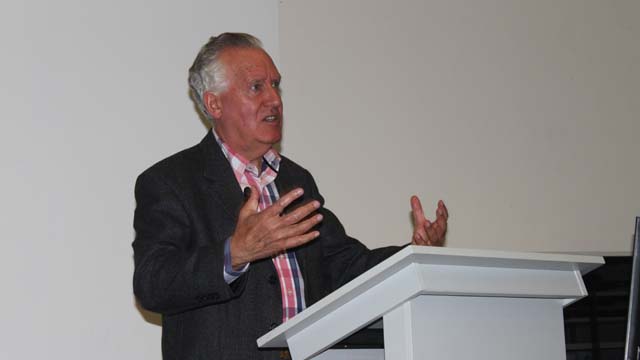
Former anti-apartheid activist and current British Cabinet Minister Peter Hain gave a talk on South Africa’s current socio-political context and the country’s way forward at Rhodes University this past Thursday 3 September.
The presentation followed a meeting with Rhodes University Vice-Chancellor Dr Sizwe Mabizela and Guy White in the UK where discussions began around a potential collaboration between Rhodes and Swansea University, of which Hain is a newly appointed Fellow.
The talk was titled From Pretoria to London: Freedom Struggle and the Future of South Africa and was opened up with a warm introduction by Rhodes Vice-Chancellor Dr Sizwe Mabizela who provided the audience with a brief breakdown of Hain’s political history and notable achievements. “If you run a quick Google search on the apartheid resistance, there is one name that will appear with remarkable regularity, and that is the name of Peter Hain,” said Mabizela.
Since his anti-apartheid activism days, Hain has gone on to become an author, the current British Cabinet Minister, Chairperson of the Donald Woods Foundation, and a tireless campaigner for social justice and human rights. He is also an excellent storyteller and a fierce presenter.
“My parents were an ordinary white couple who did extraordinary things. One of my first memories of the struggle was when I was ten years old,” said Hain. “I remember waking up to police officers searching my room for any incriminating documents against my parents.”
Hain grew up in Pretoria, which at the height of South Africa’s apartheid regime, was the centre of apartheid. His parents would often risk everything to host activist gatherings in the front room of their home.
Hain went on to fight against apartheid himself, heading up many of the disruptions in South Africa’s white touring sports teams. The banning of South African sports tours was integral to the dismantling of apartheid and Hain recalled instances of being arrested and detained for his role in the disruptions.
“We would run onto the pitch in the middle of cricket matches and always end up in handcuffs,” he said. “Other times we would inject solidifying agent into the locks and hinges of the hotel doors so that the players couldn’t get out of their rooms. We helped to ensure that white South Africa never toured, and they didn’t again until Mandela’s presidency.”
After looking back at apartheid and providing the audience with tales of first-hand experience in its downfall, Hain moved on to the topic of contemporary South Africa and the persisting fault lines that have occurred as a result of the legacy left by apartheid.
“For the past 20 years, South Africa’s government has actually down a lot of fantastic work, but inequality in South Africa is still on the rise. There are some of the worst cases of inequality in the world in South Africa,” said Hain.
While the ANC government did well to provide access to education for South Africa’s current youth, Hain explained that it’s hardly a lack of resources that’s the problem, but rather how these resources are being distributed.
“South Africa’s service delivery is shocking. There aren’t enough teachers available, and the teachers who are employed don’t often show up to the schools,” said Hain, “It’s also no secret that corruption is crippling well intended administrative structures within government.”
Hain concluded that Africa has awoken as a continent that can soon become one of the largest economic contributors in the world. “South Africa can be the driver of Africa’s potential,” said Hain, “It is still a country with a firm economic base, a good legal environment for business, strong independent civil societies, and an independent media. It’s now up to the born frees to reclaim Mandela’s legacy for which so many of us fought.”
By Dave Mann
